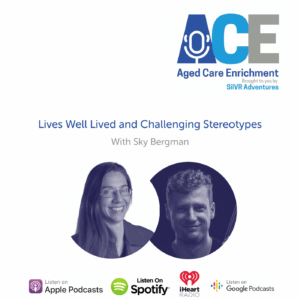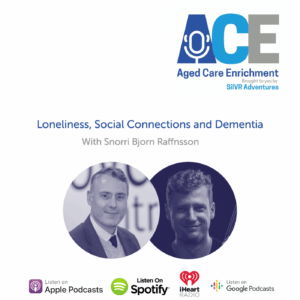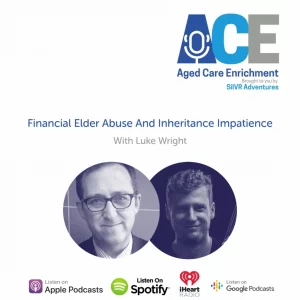Transcript
Ash de Neef: Well, Joe, thank you so much for joining us on the show today.
Joseph Ibrahim: Thanks Ash. Happy to be here.
Ash de Neef: It’s great to, have you here And. there’s lots of different directions we can go in as we were just chatting about before we started recording. But one area that’s very interesting to myself and I think to our listeners is the fallout of the Royal commission and the government’s so-called five pillars approach.
It’s been six months since the final reports of the Royal commission what’s changed. What action is on the horizon?
Joseph Ibrahim: It’s difficult to know, Ash if you’re searching through the papers or the industry periodicals. The Royal commission I think everyone needs to understand has finished, they’re gone, the commissioners no longer have a role. The report was tabled in parliament on the 1st of March, and so now it’s entirely up to the government as to what it does, and essentially the voters to hold the government to account.
The government had agreed to, I think, approximately about 120 to 126 recommendations they accepted or accepted in principle. And there’s been a couple of announcements with some money being put forward to start looking at, I think the revision of, or the formation of a new act. But there haven’t been any really large announcements or publicity if there have been. And I think that the COVID pandemic really has taken attention away.
So if you think what’s happening in Australia at the moment is there’s obviously the defense arrangement with the submarines and the alignment with the UK and US. There’s the sexual violence with the me too movement, and it’s been particularly prominent in Australia with the incidents that occurred in Canberra that’s brought it far more to the public prominence. We’ve of course been living with COVID and the requirements around that. And I think people are just trying to get through their day and the work and just getting to work and finishing your days work is an accomplishment.
So there’s been very little attention paid to what does the future look like?
Ash de Neef: And do you think that we’ve missed the boat there because of these extra factors?
Joseph Ibrahim: They say life’s all about timing. I think that the amount of publicity that the Royal commission got was really quite poor at the end. If listeners recall Scott Morrison, our Prime Minister, gave essentially a doorstop press conference before the report was publicly accessible. So I was listening to him and frantically trying to find the report on the website, and there was just no way to read that report, and then to ask the questions that we wanted. And there’s not been a sit down media interview with the Prime Minister or the ministers about the details of the Royal Commission.
The other thing that was handled politically was the response to the Royal Commission was delivered on the night of the federal budget in may, and so again the details got lost in that.
We know from the budget projections and the government that they put aside about $18 billion for aged care, and about 6 billion of that’s for home care to fill a hole that’s already there. So that 6 billion really just brings us up to a smaller waiting list for people waiting for home care packages, it doesn’t actually improve the quality of the service just improves access. Which is important.
Joseph Ibrahim: The other remaining money has been promised over essentially five years. And as I’ve said before that we’ll probably have had two elections in that time, another five budgets and depending on what’s happening that money may or may not come through. Most of that money is promised, I think in the fourth and fifth years of the planning cycle, when there’s clearly a desperate need now to rectify problems that are in the sector.
I think Ash you have to remember that the commissioner said that one in three residents are subject to either suboptimal care, neglect or abuse. So that’s one in three persons. So if that’s a third, I don’t see how the amount of money that they’ve put in is going to make those changes. And again, without boring the listeners the average budget in terms of aged care spending from the government is somewhere between 12 to 14 billion each year. For the whole aged care sector it’s up around the 20, 25 billion, depending on how you count. So the money that was promised in the federal budget over five years is somewhere between a five to 10% overall increase in funding to aged care. Which is really small when you consider the scale of the problem.
Ash de Neef: Yeah and not to mention the situations you’ve just described there were sounds like more or less they’re kicking the problem down the road and hoping they don’t have to deal with it.
Joseph Ibrahim: Yeah and we’ve seen that before. And again the Royal Commission commented on essentially 20 inquiries in 20 years. And I think the total is 35 inquiries over the last 40 years in aged care. And I think that’s worth reflecting on. It’s easy to want to slate the blame home directly to the people in power now. But the pattern of behavior, if you look at those 35 inquiries over 40 years, is there a different people, different political parties, different groups involved at each time.
And so it really suggests an inherent systemic issue about either the nature of politics or the nature of people, that aged care gets kicked down the road every time and neglected. People often attribute that to ageist attitudes, that may be one contributor. The other obvious contributor is there’s really no votes in aged care.
The residents in aged care often don’t vote, and most of the population thinks that we’re going to remain well and healthy or might have a need age care. And so we, we are not concerned about it in the same way that we’re concerned about healthcare.
Joseph Ibrahim: And that’s an interesting contrast because everyone can see themselves either breaking a leg or hurting themselves on a holiday, but you don’t experience being 90 for a day, go to aged care and then you’re back to being 40 again. And I think that’s one of the issues is you can’t experience being old till you get, but you can experience getting sick and getting back to health at any age. And so the importance of a good health care system is obvious to everyone.
But the benefits of a good aged care system is really only obvious to the people that are using it at the time. And again, if you look at proportions and for people who are good with numbers. Australia’s populations around 25 million, there’s 200,000 people living in residential aged care, and there’s 1 million people accessing home-based care.
And so as a fraction, that’s a fraction of the total population. So if you want to think about it as one in every 25 people is connected to aged care in some way or shape, which isn’t very big to get anything done.
Ash de Neef: Yeah to translate some of those numbers into practical terms to somebody who might be working in aged care. Over the next 3, 4, 5 years, what changes do you expect that somebody working with the industry will see?
Joseph Ibrahim: The beauty of forecasting is that you can speak with confidence about the future, until people replay it for you in five years time and then an expert looks like a fool.
I think you can project, and I think what futurists to do is sort of say “give me the conditions in five years time, do you believe we’re still going to have residential aged care or do you think there’ll be an abolition movement to say aged care and residential aged care shouldn’t exist and should be incorporated into society?” Will aged care be funded in the same way?
And so once you start placing conditions on it, you can start to project what it might look like. The things that are definite are one, we are getting older, two we don’t have a cure for dementia. And so we will have more older people, we will have more older people with dementia.
Expectations on the standard of care increase each year. And so the standard of care expected in 2025/2030 is going to be higher than it is now. And we will have a larger population that requires care. And are we as a society willing to fund that?And will we have people that are trained and capable of delivering the care?
And at the moment, there’s no evidence that we’re going to have the workforce that we need. We currently don’t have the workforce for the existing situation. And the pandemic has really heightened significant differences between classes and social inequities.
So I think that If I’m predicting the future in terms of a skeptical approach, I think it’s just going to be much tougher. There’s going to be bigger gaps between what we could provide and what is being provided and the need for advocacy and fighting for your rights is going to have to be a far more preeminent. You won’t be able to take a relaxed attitude thinking that everything is taken care of you’ll need to be advocating far more.
The Pollyanna view is that the Royal Commission will lead our government and society to better understand the funding model needed that will go through either some sort of insurance scheme or levy to increase funding to aged care. And that it will be of a similar standard and monitored in the same way that health care is, and so we can trust it.
Joseph Ibrahim: You know where does the truth lie is, I guess dependent on how you see the world. For me I think that we’re going to go through a phase of greater social inequities until the current generation of 20, 15 to 25 year olds mature and are in a position of power. And if they hold true to the views that they share now, then we start to see things around social justice, social equity, and looking after vulnerable populations, really, what is it, around the 2040 mark?
So we need another 20 years for those 15 year olds to get the 35 and the 25 year olds to be 45 and in positions of influence. I think that’s where you might see generational change. Clearly the junior staff that I work with are far more socially aware and motivated then certainly in my time. And that sort of very selfish phase or people being you make your own life and if you are poor, then that’s your fault. That, that sort of philosophy, I think is hopefully is starting to be shifted again.
But you know as a nation, and internationally. For a long time the eighties, nineties were really about self-determination you made success yourself. And if you didn’t succeed in life, that was your fault, and you had no one to blame. And I think that type of cultural attitudes…obviously reflected, if people want to go back and look at the 1980s, 1990s films. You’ll see a lot of that notion and the Wall Street films saying greed is good and the excesses are there.
An interesting commentary is whether, and it’s worth asking this, do you think that we should have billionaires? Should there be billionaires in the world? And why should someone need a thousand million dollars? And how is it that they can accrue that and at whose cost is?
And so I think that what would be good to start seeing is that if we’re addressing the financial social inequities. And so if the large multinational corporations are forced to pay their share of tax and that we’ve got some sort of international cooperation about managing those massive problems, then the flow on effects downstream are substantial.
So if you want to sit back and admire Bezos or Elon Musk for being able to build rocket ships, the questions are if we had some of the money that was owed in tax from those different large multinational groups, what is the flow on effect in Australia? And so if we had a greater amount in our budget and we could spend more on the vulnerable groups.
The world is interconnected. COVID shows the degree of interconnection like never before. And I think that some of the issues that we think are remote to us that have nothing to do with us, actually really do. Google, Apple and all those other companies, who make billions of dollars. And you’ve seen, I guess from the Panama papers and the others about how rich people keep their money and don’t pay their taxes has a flow on effect to everyone. And so dealing with economic inequity is one step towards solving some of the social inequalities.
Ash de Neef: Well, it sounds like we’re talking about a broader cultural shift here, and the advantage that a younger generation would have is that they’re already starting to think about these things that may not have been in the minds of people, in my generation or of your generation.
Joseph Ibrahim: Yeah, sorry. I forgot I’ve gone right off aged care, but just to show that the connections are there.
And one of the things I think that the Royal commission didn’t do well, is there was no plain language statement from the Royal commission to the general public. There was no plain language statement to residents in aged care explaining the work of the Royal commission. And the Royal commission. I think didn’t provide the context for the failure of the system. Part of that I think was related perhaps to their terms of reference.
Part of it is that the fundamental reason the aged care system is not working is there’s a failure within government and government departments, because they’re really the only constant. And they are accountable for the system.
And so normally when an organization fails, heads roll. Rightly or wrongly. And who was in charge of aged care? And who is in charge of aged care over the last 20 years? What I would have liked to have seen is the, I can’t even remember how many, maybe the 10 or even 12 aged care ministers over the last 20 years. I would’ve loved to have seen them called to give evidence to the Royal Commission and the various heads of department to explain their strategy. And what was being done over the last 20 years and what wasn’t workable.
Ash de Neef: There’s an interesting moment in the Q And a discussion that you were part of, where there’s a back and forth between you and Mike Baird, the former Premier New South Wales now CEO of Hammond care. Where he’s repeating that the responsibility lies with the providers to lead change, and you’re saying the opposite now that this is a government problem fundamentally.
Joseph Ibrahim: Look at it this way. The government sets the rules of engagement by writing the act. The government establishes the regulator what power the regulator has, what funding the regulator has, and what sanctions the regulator can apply. The government gives them money to the provider. As a taxpayer I want to know where the money is going and that the provider should be held accountable.
The provider is a business owner. Not an aged care sorry, they’re not a carer, they’re a business operator. What is it that they need to deliver? And the diversity of providers generates different motivations, and the person that receives the care is the one that’s left out of the equation.
In reality, the driver of change should be the residents and their families. They ought to be the ones that are saying, “This is what we want. This is what we need. This is not what’s being delivered. And this is how we want it.” And then for the provider to work out how do you run an organization that delivers the care that’s wanted and then to kick back to the government about what’s actually needed.
The provider, you have to remember this over 800 separate providers running 2,700 homes. So you’ve got a diversity of providers. You also have providers that are private and listed on the stock market and providers that are not for profit or faith-based and then public sector. You know the motivations or the mission statements of each of the providers is different.
So the primary responsibility of a private provider that’s listed on the stock market is to their shareholders, not to their consumers or their residents. Whereas you know, if you look at the public sector, in a sense that’s the primary purpose of having public sector homes is to provide care for the persons that the other organizations won’t or can’t. And the faith-based ones and the not-for-profits vary enormously in what their remit is.
There’s no consistency as a consumer, as a resident or family, to understand what is the primary motivation. And this creates confusion then because people aren’t separating out the care aspects from the reason for the organization to exist.
And we’ve seen in the UK, there’ve been some classic examples where large hospital trusts or large hospital services that we’re looking to get more of the market share focused on their bottom line rather than on patients and led to significant consequences in the 2000s where they forgot their primary duty was provide health care when the were pursuing the economic targets and it’s the same thing here is that – for a private business to survive, it needs to make a profit. If it doesn’t make a profit it goes out of business. Its primary purpose is not to provide care for residents, that’s its business model.
Now some of the privates do really well, operate well and function at a really high standard. Some don’t, and the ones that don’t and same applies in each of the different ownership groups.
The only method of calling people to account is the regulator. Aged care is in a bubble in terms of when people sign in, essentially they agree to stay within the bubble to resolve complaints and issues. And the regulator doesn’t have sufficient staff, sufficiently experienced staff.
And accreditation in and of itself is a model that guarantees a minimum standard doesn’t guarantee aspirational.
Joseph Ibrahim: And so when you compare accreditation, and that’s not the fault of the regulator that the sanctions that are there, accreditation gives you a minimum standard. And in health care, you get aspirational or high standards of care because you’ve got high performing teams, a large range of different professional groups and disciplines pushing each other to do better. That’s not the circumstance that you get in residential aged care.
The proportion of professionals in aged care is very small. The ability for them to innovate work together is even smaller. And so you don’t get any sort of natural improvement because there is absolutely no fat in the system to work on that.
The example I give is look, if I go to work or when I go to work tomorrow to hospital, I’ll have 10 or 12 senior doctors I can call on for help in inside half an hour. And I’ve got access to potentially another 200-250 specialists, of I want to do something innovative. And I just ask for who’s interested? Who knows? Can people shave half an hour here or there to get something done?
If I’m in residential care, I might have one nurse unit manager and then predominantly personal care workers who are being paid essentially minimum wage have got multiple other responsibilities. They don’t have the training to do things that are aspirational and won’t get rewarded.
So their career is not dependent on doing innovative new things. Their job is about getting today’s tasks done. Whereas within health care, your career is based on innovation, doing new things, pushing the standard and doing the tasks.
And so the potential is far greater to do that than in aged care, and that’s another one of those fundamental differences.
Ash de Neef: Yeah. Going back to one thing that you mentioned just previously about this closed bubble you’ve done a lot of work with sexual violence in residential aged care.
And recently the Serious Incident Response Scheme (SIRS) was established. Do you think that this is going to lead to a reduction in sexual violence and elder abuse?
Joseph Ibrahim: Ah no. No we don’t think that’s what’s going to happen. There’s a couple of issues tied up.
First we don’t actually know the true rate of these events. The staff that we’ve surveyed and researched don’t necessarily recognize episodes of unwanted sexual behaviour, and if they do it’s not always reported.
The Serious Incident Response Scheme is intended to help with post-incident response. So it’s not really about prevention and what you want to system of prevention, as well as a response. The scheme does not support providers in responding better, it sets some guidance about how to report incidents and asks for care plans.
This is a situation where providers are being asked more questions, which is good, but they’re not resourced to deliver the answer that is helpful, and they’re not resourced with the expertise to manage the incidents. So if you put a new rule in, but don’t change the staff training and you don’t change their access to resources, then what you’ve got is essentially a paper exercise.
It’s important, and it’s really important that we get more information and hopefully the Serious Incident Reporting Scheme will generate more information. And it’s removed the condition about not reporting for people with cognitive impairment, which is critical.
But if we wanted that to work, then you would’ve expected the government department and the regulator to work with the police in each state and territory. To have worked with CASA and the other groups around sexual violence. To have trained staff in recognizing and responding to disclosures, in providing more support services to residents, and having a strategy as to what happens around issues where the resident the victim or the survivor and the perpetrator remain co housed. How you supposed to manage that?
There’s a lot of work still to be done, and the response scheme won’t deliver on that.
Ash de Neef: Are there structural elements that are contributing to the problem here? For example, you mentioned the co-housing situation where the survivor and a perpetrator, but if we’re talking about actual reduction and prevention of these incidents, is it training of staff or what is it practically that will see a reduction.
Joseph Ibrahim: What’s needed is a systems approach where you’ve got to look at the multiple layers in what contributes to it. There’s a tendency to want a quick fix. And to find the one thing that would work and there really isn’t for a complex problem.
You want to be starting with what is the regulators approach? Are they equipped? Do they have the staff that they need for these specialized type of problems? Are they collating, feeding back learnings that have occurred? Does the organization, have they trained the board, their senior staff, have they trained their care staff? Are the residents and families aware of the issues and how they’d respond?
Do we have the relationships in the contacts with medical specialists, psychologists, social workers, counselors that can step in and help with that. So all of that really needs a, it’s a whole of system approach rather than one specific thing.
We’ve started with a training course, partly to show people that it can be done. And also to show that. Because in terms of showing people’s knowledge pre and post, is that there’s a substantial change.
One of the biggest issues for us is the lack of recognition that sexual violence occurs. And then the second issue is people don’t actually have the language vocabulary or the knowledge that something could actually be done. I think that’s one of the reasons that we’ve put that together.
Ash de Neef: Yeah, Joe we’ve, covered a whole lot today and really appreciate your time and your insight. Where can people find out more about your work and some of the things we’ve been talking about today?
Joseph Ibrahim: Well there’s two places really to look. The first is through the advocacy work which I do, which is not part of any organization except I guess myself and my small team. So you could find that at profjoe.com.au. The other work that I do with the university, you’ll find at the Department of Forensic Medicine, Monash University. And you’ll find our work there or people can just email me if they’ve got some questions.
Ash de Neef: Awesome. Joe, thank you so much for your time today.
Joseph Ibrahim: No worries, Ash. Thank you.




